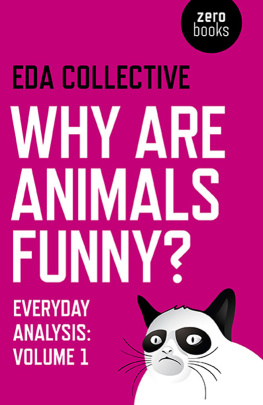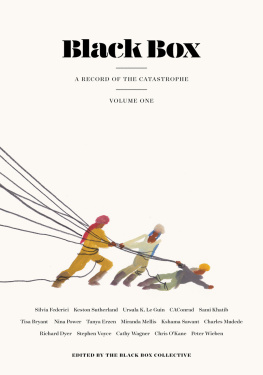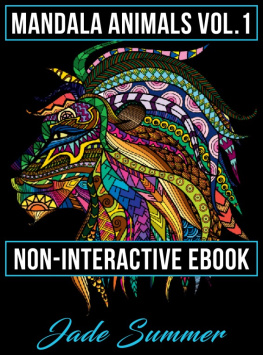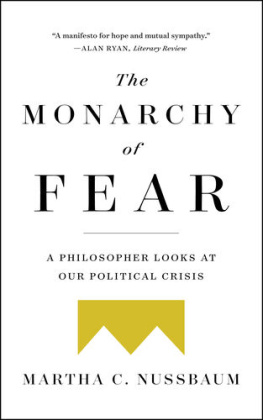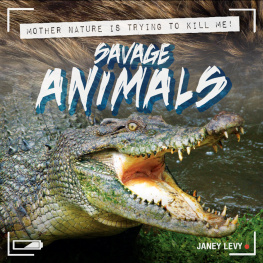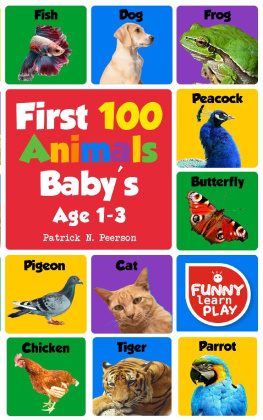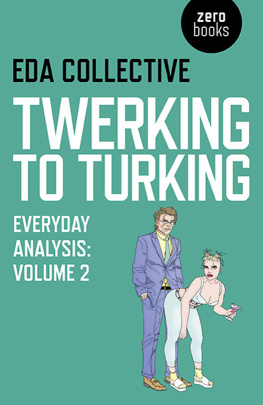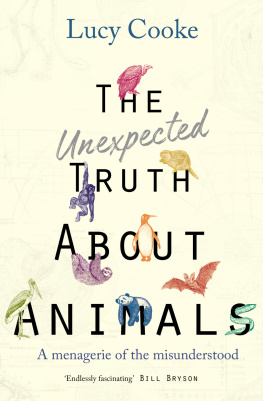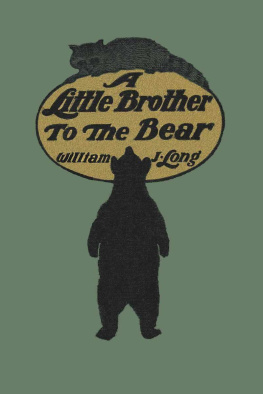Collective - Why are Animals Funny?
Here you can read online Collective - Why are Animals Funny? full text of the book (entire story) in english for free. Download pdf and epub, get meaning, cover and reviews about this ebook. year: 2014;2015, publisher: John Hunt Publishing, genre: Romance novel. Description of the work, (preface) as well as reviews are available. Best literature library LitArk.com created for fans of good reading and offers a wide selection of genres:
Romance novel
Science fiction
Adventure
Detective
Science
History
Home and family
Prose
Art
Politics
Computer
Non-fiction
Religion
Business
Children
Humor
Choose a favorite category and find really read worthwhile books. Enjoy immersion in the world of imagination, feel the emotions of the characters or learn something new for yourself, make an fascinating discovery.
- Book:Why are Animals Funny?
- Author:
- Publisher:John Hunt Publishing
- Genre:
- Year:2014;2015
- Rating:3 / 5
- Favourites:Add to favourites
- Your mark:
- 60
- 1
- 2
- 3
- 4
- 5
Why are Animals Funny?: summary, description and annotation
We offer to read an annotation, description, summary or preface (depends on what the author of the book "Why are Animals Funny?" wrote himself). If you haven't found the necessary information about the book — write in the comments, we will try to find it.
Why are Animals Funny? — read online for free the complete book (whole text) full work
Below is the text of the book, divided by pages. System saving the place of the last page read, allows you to conveniently read the book "Why are Animals Funny?" online for free, without having to search again every time where you left off. Put a bookmark, and you can go to the page where you finished reading at any time.
Font size:
Interval:
Bookmark:


First published by Zero Books, 2014
Zero Books is an imprint of John Hunt Publishing Ltd., Laurel House, Station Approach,
Alresford, Hants, SO24 9JH, UK
www.johnhuntpublishing.com
www.zero-books.net
For distributor details and how to order please visit the Ordering section on our website.
Text copyright: Alfie Bown and Daniel Bristow 2013
ISBN: 978 1 78279 392 2
All rights reserved. Except for brief quotations in critical articles or reviews, no part of this book may be reproduced in any manner without prior written permission from the publishers.
The rights of Alfie Bown and Daniel Bristow as authors have been asserted in accordance with the Copyright, Designs and Patents Act 1988.
A CIP catalogue record for this book is available from the British Library.
Design: Stuart Davies
Printed and bound by CPI Group (UK) Ltd, Croydon, CR0 4YY
We operate a distinctive and ethical publishing philosophy in all areas of our business, from our global network of authors to production and worldwide distribution.
A number of people deserve special thanks for their contributions to the Everyday Analysis project. Firstly, we would like to thank all those who have contributed to this book and to the blog, not just for their work but for their enthusiasm for the project and their inspiring commitment to its cause. A very special thanks is due to the Centre for Vild Analyse, and especially Henrik Jker Bjerre, who were an inspiration for the project, and who have supported us throughout. We would like to extend a special thanks also to Jo Rose and Lucy Burns, for help getting the original blog up and running, and to Harriet Hill-Payne, for giving us the platform of the Mancunion, and allowing us to reach a wider audience in the early days of the project, and to the Huffington Post for featuring our blog. We would also like to thank Jeremy Tambling, whose influence can be seen in these pages. The same is true of Mladen Dolar. And to Fiona Peters and Richard Stamp we owe much. We extend our gratitude to our students, whose enthusiasm and criticism has been invaluable in the development of the project. Finally, thanks especially to Zero books, and to all of our friends and families.
What is Everyday Analysis?
Everyday Analysis, or EDA, is a collective project, based primarily in Manchester and London, that takes everyday objects, items, adverts, signs, art, music, and anything else, and offers analysis of them. Ultimately the projects aim is to demonstrate how everyday life is full of complexities and inconsistencies which insist on being read and re-read, and which have the capacity to challenge and change the way we think. Our project, beginning in January 2013, found its initial manifestations online at our blog, and in a weekly column within the pages of the Mancunion, the countrys largest University newspaper, and later as a featured blog at the Huffington Post. We regularly update our content with articles from a host of contributors from across the globe, and have been delighted to see our following grow steadily over the projects short lifespan.
The Everyday Analysis collective is relatively large, with currently around a dozen contributors from a variety of backgrounds, and many others who have been involved in various ways since the project began. The collective element of the project is important to us. We aim to assemble a variety of voices, a range of positions from which interpretations are offered and can be placed in conversation with each other. As the second part of our introduction explains in more detail, we want to avoid providing answers and explanations, and instead set out to open up discussions and conversations about things which often go un-interrogated. We hope that having no presiding authorial voice is part of our fidelity to this cause.
The opening of a collaborative work by Gilles Deleuze and Flix Guattari reads: the two of us wrote [] together [and] since each of us was several, there was already quite a crowd.We too aim to write from this crowd perspective, not tied to the restrictive idea of a single-subject, a single author whose views and text are without multiplicity. Instead, we aim to give a variety of readings, which speak to each other, free from the limitation of a single authorial intention.
As recounted in an anecdote told to us by the noted literary scholar P. N. Furbank, T.S. Eliot had once confronted E. M. Forster over his granting to D. H. Lawrence the title of the greatest imaginative novelist. What do you mean by greatest and what do you mean by novelist? Eliot had questioned, and Forster retorted: Mr Eliot is trying to catch me in his web, but sometimes I would rather be a fly than a spider. Often, it seems, one has to commit, to risk ones reading and ones view, even if it means being caught. The articles in this volume are commitments to particular readings, but they are also committed to their own provisionality, to the need for continued discussion and debate. F. R. Leavis once remarked that the ideal critical assertion is: This is so, is it not? Yes, but The articles here make a gesture not unlike this one in their attempts to open up further reflection and debate, and as a collective we hope that these discussions are just beginning, and that they encourage more analyses of the everyday to arise.
From smartphones to the 2010 UK general election, from toasties to Margaret Thatcher, from current affairs to music and film, all sorts of subjects are covered in our short and to-the-point articles, which aim to expose some of the awkward underpinnings of events and phenomena that might otherwise get simply explained away through a populism-courting common sense that rebrands our discontent and detriment, and resells it to us as our recommended daily allowance (another aim has been to reintroduce a certain mode of aesthetic cultural criticism that has been lacking in mainstream media hegemonies). Such ideological falsification and obfuscation is what we oppose. In this we might situate our project as following in the footsteps of
In his Luvre claire, Jean-Claude Milner defines thought as something whose existence imposes on those who havent thought it. We can therefore construe Everyday Analysis as a defence of bringing the everyday culture, advertising, spin-doctoring, memes, tweets, art, the popular and the avant-garde into this realm of theory, and we must also construe Everyday Analysis as a defence of theory itself.
A Defence of Theory
Wed now like to continue this introduction in something of the spirit of Sir Philip Sidney and Percy Bysshe Shelley, who both composed Defences of Poetry. Their texts thus set a mark for the articles in this book, and for this, its introduction; and we will set out by attempting to do something similar for theory as Sidney and Shelley have done for poetry; this, by following their Defences amalgam styles of part-apologia, part-manifesto.
Theory it is put in what get called scare-quotes because we must begin by attempting to define it, and in doing so, to disambiguate it from certain associations and assumptions. Generally, the word encompasses or tries to a huge body of works (as heterogeneous in their unification as one would be led to believe when witnessing the desperate attempts at homogenising them being made today). A body, therefore, still very much compartmentalisable into categories of all sorts of disciplines philosophy, cultural studies, sociology, literary studies, psychoanalysis, anthropology, etc. and which, in times of auld, found such labels as the human sciences. But the lumping all together of these discourses into this one scary word by scaremongers scared of it and its possibilities reverses an old adage and makes us wary of a policy of
Font size:
Interval:
Bookmark:
Similar books «Why are Animals Funny?»
Look at similar books to Why are Animals Funny?. We have selected literature similar in name and meaning in the hope of providing readers with more options to find new, interesting, not yet read works.
Discussion, reviews of the book Why are Animals Funny? and just readers' own opinions. Leave your comments, write what you think about the work, its meaning or the main characters. Specify what exactly you liked and what you didn't like, and why you think so.

